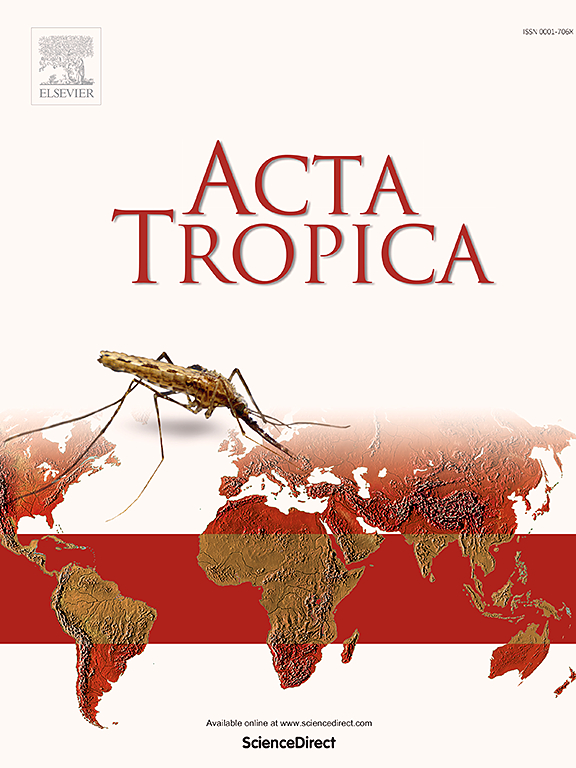Impact of social behavioural change for reducing risk of climate-sensitive infectious diseases in the emergency context of Cabo Delgado, Mozambique: a pre-post intervention study
IF 2.1
3区 医学
Q2 PARASITOLOGY
引用次数: 0
Abstract
Background
Mozambique's minimal contribution to global gas emissions contrasts sharply with the significant impact climate change has on the region, particularly in terms of frequent droughts, cyclones, and floods. These climate-related disasters exacerbate vulnerabilities related to food security, human health, and economic growth. This study evaluates the impact of a Social Behavior Change (SBC)-based intervention on preparedness against water-borne diseases (WBDs) and vector-borne diseases (VBDs) among communities in Cabo Delgado, Mozambique.
Methods
This prospective, before-after, community-based study was conducted in six districts of Cabo Delgado province from October 2022 to December 2023. The intervention focused on promoting WASH practices and preventive measures through the Mozambican Ministry of Health's "Familia Modelo" strategy. Data were collected via face-to-face interviews with 1602 households at both baseline and endline.
Results
The study demonstrated significant improvements in key areas, including the availability of latrines, mosquito nets, food drying facilities, and sanitary landfills. Handwashing facilities, safe water treatment, and storage systems showed the largest increases. The median preparedness score improved from 3 (IQR 2–4) to 6 points (IQR 4–7) out of a maximum of 7 points (p < 0.0001). However, a small percentage of households lost access to certain amenities, and challenges persisted, particularly among internally displaced persons (IDPs), who did not show significant improvement in preparedness due to their unique challenges.
Conclusions
The intervention improved preparedness in several domains, emphasizing the effectiveness of SBC approaches in reducing risk factors for climate-sensitive diseases. However, continued efforts are needed to address vulnerabilities, particularly among IDPs and overcrowded households. Education and community-based actions remain crucial for enhancing adaptive responses to climate hazards and mitigating the detrimental effects of climate change on public health.
莫桑比克德尔加多角紧急情况下社会行为改变对减少气候敏感传染病风险的影响:干预前后研究
莫桑比克对全球气体排放的贡献极小,与气候变化对该地区的重大影响形成鲜明对比,特别是在频繁的干旱、旋风和洪水方面。这些与气候有关的灾害加剧了与粮食安全、人类健康和经济增长有关的脆弱性。本研究评估了以社会行为改变(SBC)为基础的干预措施对莫桑比克德尔加多角社区防范水传播疾病(wbd)和媒介传播疾病(VBDs)的影响。方法于2022年10月至2023年12月在德尔加多角省的6个地区进行前瞻性、前后、社区研究。干预措施的重点是通过莫桑比克卫生部的“模范家庭”战略促进讲卫生的做法和预防措施。通过对1602户家庭的面对面访谈收集数据,包括基线和终点。结果研究表明,在关键领域有了显著改善,包括厕所、蚊帐、食品干燥设施和卫生垃圾填埋场的可用性。洗手设施、安全水处理和储存系统的增幅最大。准备得分中位数从3分(IQR 2-4)提高到6分(IQR 4-7),满分为7分(p <;0.0001)。然而,一小部分家庭失去了使用某些便利设施的机会,挑战仍然存在,特别是国内流离失所者,由于他们面临独特的挑战,他们的准备工作没有明显改善。结论该干预措施改善了多个领域的准备工作,强调了SBC方法在减少气候敏感疾病危险因素方面的有效性。然而,需要继续努力解决脆弱性问题,特别是国内流离失所者和过度拥挤家庭中的脆弱性问题。教育和社区行动对于加强对气候灾害的适应性应对和减轻气候变化对公共卫生的有害影响仍然至关重要。
本文章由计算机程序翻译,如有差异,请以英文原文为准。
求助全文
约1分钟内获得全文
求助全文
来源期刊

Acta tropica
医学-寄生虫学
CiteScore
5.40
自引率
11.10%
发文量
383
审稿时长
37 days
期刊介绍:
Acta Tropica, is an international journal on infectious diseases that covers public health sciences and biomedical research with particular emphasis on topics relevant to human and animal health in the tropics and the subtropics.
 求助内容:
求助内容: 应助结果提醒方式:
应助结果提醒方式:


